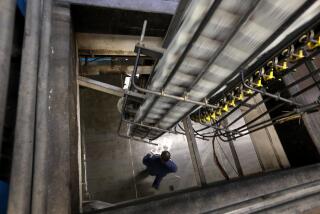High Tech Puts Typewriter Repairman in a Fix : Few Manual Machines Left to Service Because of Shift to Electronics
CROTON-ON-HUDSON, N.Y. — It has happened more than once and will likely happen again.
Some summer afternoon, Artie Feldman will open the back door of his two-story red brick house to pick some raspberries.
There it will be, abandoned on the back step. Rather than send a typewriter to the junkyard, someone has dumped it on Feldman’s stoop. “It hurts,” he says.
Artie Feldman fixes typewriters. Usually old ones. Usually manual ones.
He does not fix the lightweight electric typewriters; “el cheapos,” he calls them. He does not fix the electronic machines that have memories and go “beep.” He does not know a thing about computers.
Business for Feldman is not good.
Mechanical typewriters, like slide rules and pressure cookers, are being replaced by advanced technology. Even the word “typewriter” is giving way to “screen,” “keyboard,” “terminal” and “word processor.”
By the end of next year, it is likely that no American company will produce manual or traditional electric typewriters, a problem for Feldman and others like him who fix nothing but.
Pushed Out at 50
Computers first began to affect Arthur S. Feldman in 1974 when he lost his full-time job. For more than 14 years, he had serviced the typewriters, pneumatic tube message carriers, pencil sharpeners, adding machines and time clocks of the New York Times.
He spent most of his time on typewriters. When computers were brought in, Feldman was pushed out. He asked to be trained to service computers, Feldman says, but was ignored, he suspects, because he was 50 years old at the time. He was offered a job as a message clerk with the same pay but turned it down.
“I’d rather shine shoes on Broadway than take the job you’re giving me,” Feldman recalls telling his supervisor.
He supported himself by fixing typewriters at the offices of the magazines and out-of-town newspapers with bureaus in New York City.
But during the past few years, even the smaller offices have been telling Feldman that his services were no longer needed. Olivetti, Royal, and Olympia mechanical typewriters were giving way to higher technology, like the personal computer on which this story was written.
What Feldman was experiencing was happening across the country. The computer microchip was dramatically changing the business of typing.
With the help of the microchip, electronic typewriters have memories, spelling checkers and the ability to correct errors before they are printed. And many offices have moved beyond these new electronic typewriters and installed computer terminals that perform many of the jobs once handled by the manual typewriter.
Based on estimates provided by Dataquest, a San Jose research firm, the electric’s share of the some 1.2 million office typewriters sold each year will drop from 9% in 1986 to 7% of the market this year.
And among those who type at home, Smith-Corona estimates that the traditional electric typewriter will drop from 22% of the market in 1986 to 11% of the market this year. In 1985, electrics accounted for more than one-third of the home typewriters sold.
Like a Dinosaur
And the significance of manual typewriters is practically nil. Smith-Corona and every other U.S. manufacturer stopped production of manual typewriters within the past four years.
“Manuals are a dinosaur,” says Fred Feyerhacke, director of marketing at Smith-Corona.
While computer-related technology moved into newsrooms about 10 years ago, it was only during the past few years that it swept into smaller offices and homes. Feldman saw the changes first hand.
1986 was an especially bad year for him. Where in the previous years he lost maybe one corporate client a year in the city, Feldman lost three in 1986, leaving him only the Los Angeles Times bureau and ARTnews magazine.
Most of Feldman’s business is limited to neighbors, a couple of small local businesses, and Croton’s churches and its one synagogue. He usually works on one typewriter a week; most repairs take only a couple of hours.
The Feldmans adapt to the decline in business with some skimping here and there.
Feldman, 63, would like to take some precautionary medical tests, but lab fees being what they are, he’ll hold off for now.
The Feldmans will keep their 23-year-old car. They’ll do without new chairs or carpeting. In October, Thelma Feldman, 55, went back to work, and that helps to make ends meet.
While Feldman is willing to alter his living habits to suit his financial needs, he will not change his way of doing business.
Won’t Reduce Prices
He says he can’t raise his repair fee: “If I were to say $45 to fix a typewriter, they’d say ‘For $40 more I could buy a new one.’ ”.
Nor will he lower the price of restored machines he’s got lying around to increase his cash flow: “It rubs me the wrong way.”
Nor will he sell of part his collection of vintage typewriters, some of which could easily fetch more than $100 apiece: “It’s the one thing I have left, so I keep them.”
Feldman says he’s satisfied to live within his means. As if to prove it, he pulls out an old 45 rpm record that he saved from his daughter’s trash bin. On the flip-side: Bo Donaldson and the Heywoods perform “Don’t Ever Look Back.”






